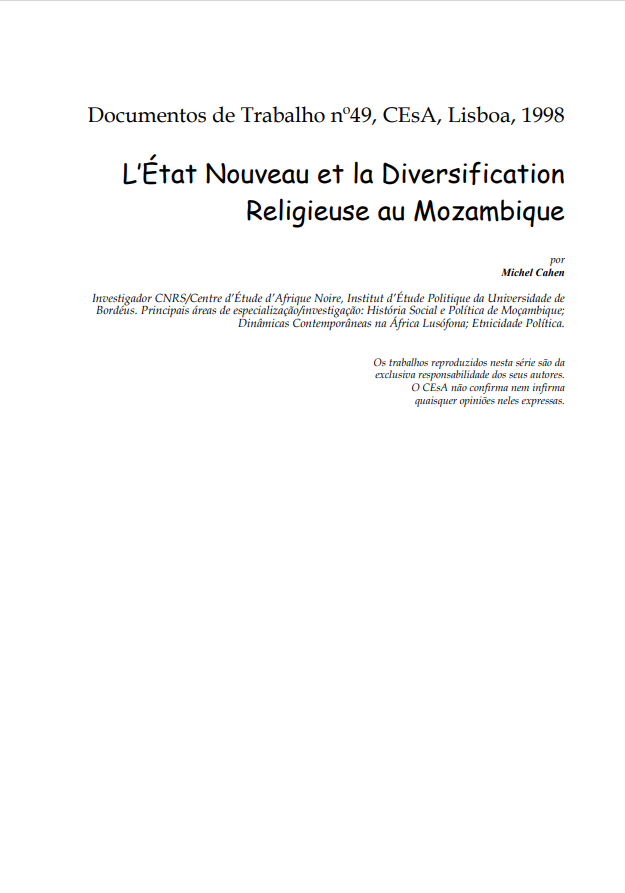Working Paper 49/1998: L’État nouveau et la diversification religieuse au Mozambique

Title: Working Paper 49/1998: L'État nouveau et la diversification religieuse au Mozambique
Author(s): Cahen, Michel
Publication Date: 1998
Publisher: ISEG - CEsA
Quotation: Cahen, Michel. 1998. "L'État nouveau et la diversification religieuse au Mozambique". Instituto Superior de Economia e Gestão. CEsA - Documentos de Trabalho nº 49/1998.
Abstract: Contemporary Portuguese history, even that of the 20th century until 1974, has obviously remained marked by that of the "Catholic kings" of the modern era and the Discoveries. The empire, with however particularities, was no exception in this religious environment. Catholicism was one of the foundations of the national (metropolitan) imagination, inseparable from the imperial idea. This country, territorially modest since Brazilian independence (1820) could not be conceived without keeping the rank of those who had "offered new worlds to the world" in the name of Christianity. This is why throughout Utramar, the integration of the Portuguese Catholic Church into the State was close, even if it can be considered more or less intense: it was a major factor in the construction of the apparatus colonial state itself which, after the humiliations of the Congress of Berlin (1885) and the British ultimatum (1890), was to constitute the major tool of greatness and prestige restored to the nation, after the long period of decline. However, in this relationship, it would be wrong to think that everything was always simple and linear. Apart from the fact that part of the colonial personnel in place during the Estado Novo (New State) had been educated even during the time of the Republic (1910-1926), did not die of clerical love and only gradually disappeared At the end of the 1950s, the administration of the territories was subject to imperatives of efficiency which depended on the contexts and did not necessarily correspond to Roman desiderata. The historical analysis presented below therefore does not relate to colonial religious history in Mozambique, as such, but to the religious policy of the State within the framework of Portuguese nationalism. Nevertheless, this question of the state makes it necessary to first clarify a few points that are debated in recent historiography relating to Portugal.
Identifier: http://hdl.handle.net/10400.5/1285
Category: Working paper
Abstract:
Contemporary Portuguese history, even that of the 20th century until 1974, has obviously remained marked by that of the “Catholic kings” of the modern era and the Discoveries. The empire, with however particularities, was no exception in this religious environment. Catholicism was one of the foundations of the national (metropolitan) imagination, inseparable from the imperial idea. This country, territorially modest since Brazilian independence (1820) could not be conceived without keeping the rank of those who had “offered new worlds to the world” in the name of Christianity. This is why throughout Utramar, the integration of the Portuguese Catholic Church into the State was close, even if it can be considered more or less intense: it was a major factor in the construction of the apparatus colonial state itself which, after the humiliations of the Congress of Berlin (1885) and the British ultimatum (1890), was to constitute the major tool of greatness and prestige restored to the nation, after the long period of decline. However, in this relationship, it would be wrong to think that everything was always simple and linear. Apart from the fact that part of the colonial personnel in place during the Estado Novo (New State) had been educated even during the time of the Republic (1910-1926), did not die of clerical love and only gradually disappeared At the end of the 1950s, the administration of the territories was subject to imperatives of efficiency which depended on the contexts and did not necessarily correspond to Roman desiderata. The historical analysis presented in L’État nouveau et la diversification religieuse au Mozambique therefore does not relate to colonial religious history in Mozambique, as such, but to the religious policy of the State within the framework of Portuguese nationalism. Nevertheless, this question of the state makes it necessary to first clarify a few points that are debated in recent historiography relating to Portugal.
Quotation:
Cahen, Michel. 1998. “L’État nouveau et la diversification religieuse au Mozambique”. Instituto Superior de Economia e Gestão. CEsA – Documentos de Trabalho nº 49/1998.





